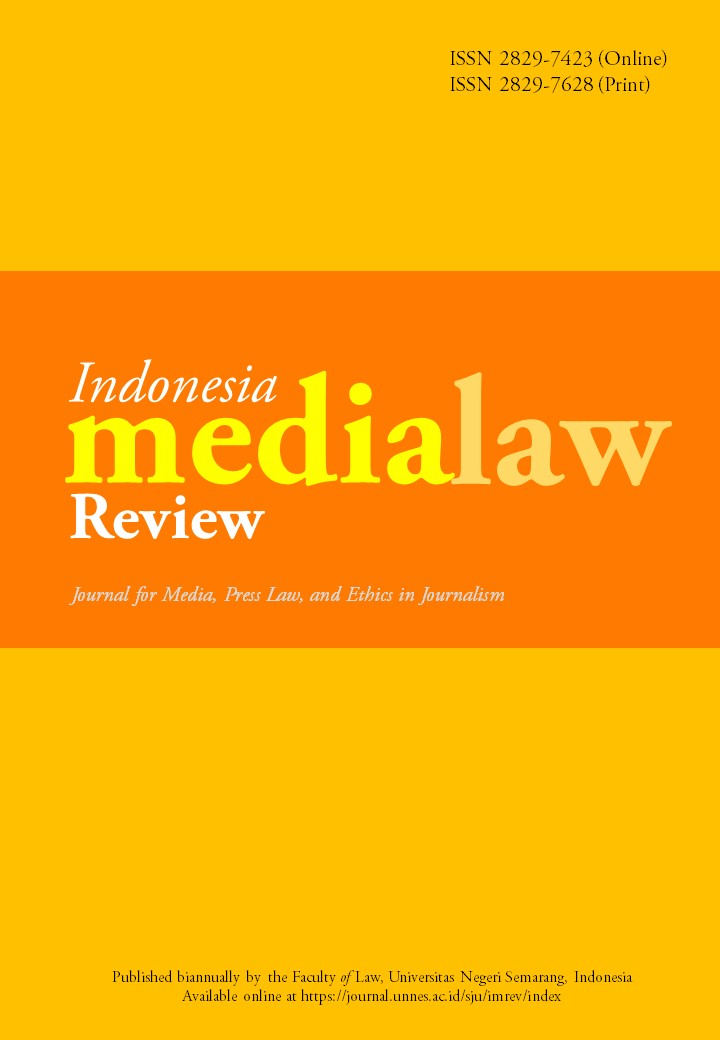Integrated Responsibility Due to Mining Activities to Environmental Crisis: Capturing Pers Opinion in Environmental Issues
Main Article Content
Abstract
This article was written so that investors could examine the obligations of the central government, territorial legislatures, financial backers, and the general public as a result of mining exercises during natural disasters. To recognize ecological justice, aggregate awareness must be demonstrated and acknowledged. Additionally, a lack of ecological issues can lead to multi-aspect emergencies like an increase in financial disparities and a decline in environmental quality. Ecological security is mandated by the 1945 Republic of Indonesia Constitution in Article 33 Paragraph 4, which takes into account carrying capacity standards and natural knowledge that is proportional to the people's economy. The methodology of this paper is qualitative. It deals with the legal problems that are happening right now. Green businesses have not yet been fully recognized by specific regulations. As a result, achieving a sense of fairness and legal certainty as a legitimate and desirable development will encourage the region to switch to control, long-term investments as a means of addressing the environmental crisis. It is everyone's responsibility to lessen the negative effects of mining investments in Indonesia, particularly on the environment.
Article Details

This work is licensed under a Creative Commons Attribution-ShareAlike 4.0 International License.
References
Book
Lahman, M. K. (2022). Writing & Representing Qualitative Research. Singapore: SAGE Publication
Journal Articles
Absori, and Nurhayati Nunik. “Kebijakan Perizinan, Sengketa Lingkungan Hidup Dan Kepentingan Investasi.” Jurnal Jurisprudence 7, no. 2 (2018): 97–104. https://doi.org/10.23917/jurisprudence.v7i2.5539.
Cho, Cheng Chung, and Rui Hsin Kao. “A Study on Developing Marine Space Planning as a Transboundary Marine Governance Mechanism The Case of Illegal Sand Mining.” Sustainability (Switzerland) 14, no. 9 (2022). https://doi.org/10.3390/su14095006.
Effendy, Nazorry. “Dampak Investasi Sektor Pertambangan Hulu Migas Terhadap Nilai Tambah Bruto Penyerapan Tenaga Kerja Dan Import Content Di Indonesia.” Jurnal Manajemen Strategi Dan Aplikasi Bisnis 2, no. 2 (2019): 45–54. https://doi.org/https://doi.org/10.36407/jmsab.v2i2.76.
Hartana. “Hukum Pertambangan (Kepastian Hukum Terhadap Investasi Sektor Pertambangan Batubara Di Daerah).” Jurnal Komunikasi Hukum 3, no. 1 (2017): 50–81. https://doi.org/http://dx.doi.org/10.23887/jkh.v3i1.9244.
Holli, Nangkoda Yanti. “Tanggung Jawab Pemerintah Terhadap Tata Kelola Lingkungan Hidup Di Sekitar Tambang Menurut Undang-Undang Nomor 32 Tahun 2009 Tentang Perlindungan Dan Pengelolaan Lingkungan Hidup.” Lex et Societatis V, no. 3 (2017): 6–18. https://doi.org/https://doi.org/10.35796/les.v5i3.15573.
Keenan, Julia, Deanna Kemp, and John Owen. “Corporate Responsibility and the Social Risk of New Mining Technologies.” Corporate Social Responsibility and Environmental Management 26, no. 4 (2019): 52–60. https://doi.org/10.1002/csr.171.
Mohajan, H K. “. Qualitative Research Methodology in Social Sciences and Related Subjects. Journal of Economic Development, Environment and People, 7(1), 23. Https://Doi.Org/10.26458/Jedep.V7i1.571 (2018): 23.
Pelz, Paul, Steven Poelhekke, Paul Pelzl, Peter Lanjouw, Julian Emani Namini, Beata Javorcik, Massimiliano Cali, et al. “Department Of Economics OxCarre (Oxford Centre for the Analysis of Resource Rich Economies) OxCarre Research Paper 214 Good Mine, Bad Mine: Natural Resource Heterogeneity and Dutch Disease in Indonesia Good Mine, Bad Mine: Natural Resource Heterogeneity” (2018). https://www.economics.ox.ac.uk/materials/working_papers/4871/oxcarrerp2018214.pdf.
Rahayu, Derita Prapti, Faisal Faisal, Rafiqa Sari, and Ndaru Satrio. “Law Enforcement in the Context of Legal Culture in Society.” Law Reform 16, no. 2 (2020): 76–89. https://ejournal.undip.ac.id/index.php/lawreform/article/view/33780.
Rais, M., R. Abdullah, E. Malik, D. Mahmuda, D. Pardana, L. O.D. Abdullah, A. Dja’Wa, et al. “Impact of Sand Mining on Social Economic Conditions of Community.” IOP Conference Series: Earth and Environmental Science 343, no. 1 (2019). https://doi.org/10.1088/1755-1315/343/1/012132.
Rosyid, Fadhila Achmadi, Fandi Arapenta Ginting, and Arjo Prawoto Wibowo. “Analisis Dampak Investasi Terhadap Perekonomian Daerah : Studi Kasus Investasi Pertambangan Mineral Logam Provinsi Papua.” Indonesian Mining Professionals Journal 2, no. 1 (2020): 11–29. https://doi.org/Doi : https://doi.org/10.36986/impj.v2i1.18.
Waniatri, Wina, Muslihudin Muslihudin, and Sri Lestari. “Dampak Sosial, Ekonomi Dan Lingkungan Pertambangan Pasir Di Desa Luragung Landeuh Kuningan, Jawa Barat.” Jurnal Ilmu Lingkungan 20, no. 2 (2022): 79–90. https://doi.org/10.14710/jil.20.2.279-290.
Yuniar, Vania Shafira. “Legal Protection for Foreign Investment in the Mineral and Coal Mining Sector in Indonesia.” Dialogia Iuridica: Jurnal Hukum Bisnis Dan Investasi 12, no. 2 (2021): 12–14.https://doi.org/10.28932/di.v12i2.3555.
Yuniarti, Dewi Santoso. “Prinsip Reasonableness Dalam Penilaian Tanggung Jawab Sosial Dan Lingkungan Investor Pertambangan Menurut Hukum Investasi Internasional.” Jurist-Diction 2, no. April 2019 (2019): 73–90. https://doi.org/https://doi.org/10.20473/jd.v2i3.14360.
